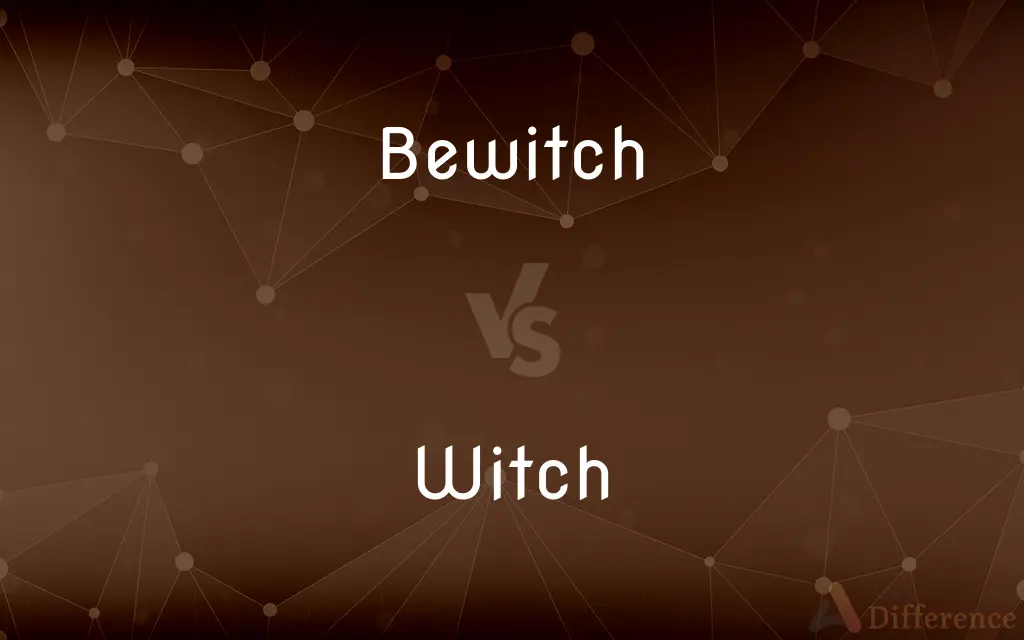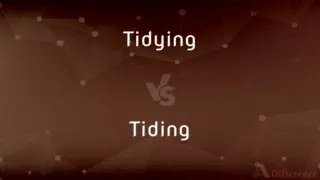Bewitch vs. Witch — What's the Difference?

Difference Between Bewitch and Witch
ADVERTISEMENT
Compare with Definitions
Bewitch
Bewitch (1945–1959) was a Thoroughbred race horse born in 1945 at Calumet Farm, Kentucky, United States in the same crop in which the stallion Bull Lea produced Citation and Coaltown. Each of them was eventually inaugurated into the Thoroughbred Hall of Fame.
Witch
A person, especially a woman, claiming or popularly believed to possess magical powers and practice sorcery.
Bewitch
To place under one's power by magic; cast a spell over.
Witch
A believer or follower of Wicca; a Wiccan.
Bewitch
To captivate completely; fascinate.
ADVERTISEMENT
Witch
(Offensive) An old woman considered to be ugly or frightening.
Bewitch
(transitive) To cast a spell upon.
Witch
A woman considered to be spiteful or overbearing.
Bewitch
(transitive) To fascinate or charm.
I was bewitched by the sight of the girl dancing in the forest.
Witch
(Informal) A woman or girl considered to be charming or fascinating.
Bewitch
(transitive) To astonish, amaze. en
Witch
One particularly skilled or competent at one's craft
"A witch of a writer, [she] is capable of developing an intensity that verges on ferocity" (Peter S. Prescott).
Bewitch
To gain an ascendency over by charms or incantations; to affect (esp. to injure) by witchcraft or sorcery.
See how I am bewitched; behold, mine armIs like a blasted sapling withered up.
Witch
To work or cast a spell on; bewitch.
Bewitch
To charm; to fascinate; to please to such a degree as to take away the power of resistance; to enchant.
The charms of poetry our souls bewitch.
Witch
To cause, bring, or effect by witchcraft.
Bewitch
Attract; cause to be enamored;
She captured all the men's hearts
Witch
To use a divining rod to find underground water or minerals; dowse.
Bewitch
Attract strongly, as if with a magnet;
She magnetized the audience with her tricks
Witch
A person who practices witchcraft.
Bewitch
Cast a spell over someone or something; put a hex on someone or something
Witch
(now usually particularly) A woman who is learned in and actively practices witchcraft.
Witch
An ugly or unpleasant woman.
I hate that old witch.
Witch
One who exercises more-than-common power of attraction; a charming or bewitching person.
Witch
One given to mischief, especially a woman or child.
Witch
(geometry) A certain curve of the third order, described by Maria Agnesi under the name versiera.
Witch
The storm petrel.
Witch
Any of a number of flatfish:
Witch
Glyptocephalus cynoglossus (Torbay sole), found in the North Atlantic.
Witch
Lepidorhombus whiffiagonis (megrim), found in the North Atlantic.
Witch
Arnoglossus scapha, found near New Zealand.
Witch
The Indomalayan butterfly Araotes lapithis, of the family Lycaenidae.
Witch
A cone of paper which is placed in a vessel of lard or other fat and used as a taper.
Witch
(intransitive) To dowse for water.
Witch
To practise witchcraft.
Witch
(transitive) To bewitch.
Witch
A cone of paper which is placed in a vessel of lard or other fat, and used as a taper.
Witch
One who practices the black art, or magic; one regarded as possessing supernatural or magical power by compact with an evil spirit, esp. with the Devil; a sorcerer or sorceress; - now applied chiefly or only to women, but formerly used of men as well.
There was a man in that city whose name was Simon, a witch.
He can not abide the old woman of Brentford; he swears she's a witch.
Witch
An ugly old woman; a hag.
Witch
One who exercises more than common power of attraction; a charming or bewitching person; also, one given to mischief; - said especially of a woman or child.
Witch
A certain curve of the third order, described by Maria Agnesi under the name versiera.
Witch
The stormy petrel.
Witch
A Wiccan; an adherent or practitioner of Wicca, a religion which in different forms may be paganistic and nature-oriented, or ditheistic. The term witch applies to both male and female adherents in this sense.
Witch
To bewitch; to fascinate; to enchant.
[I 'll] witch sweet ladies with my words and looks.
Whether within us or withoutThe spell of this illusion beThat witches us to hear and see.
Witch
A female sorcerer or magician
Witch
A being (usually female) imagined to have special powers derived from the devil
Witch
An ugly evil-looking old woman
Witch
Cast a spell over someone or something; put a hex on someone or something
Share Your Discovery

Previous Comparison
Conceptualization vs. Design
Next Comparison
Tidying vs. Tiding














































